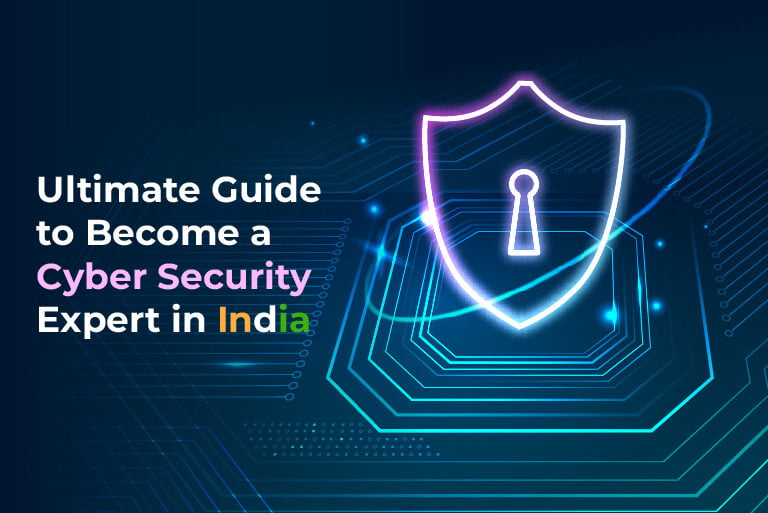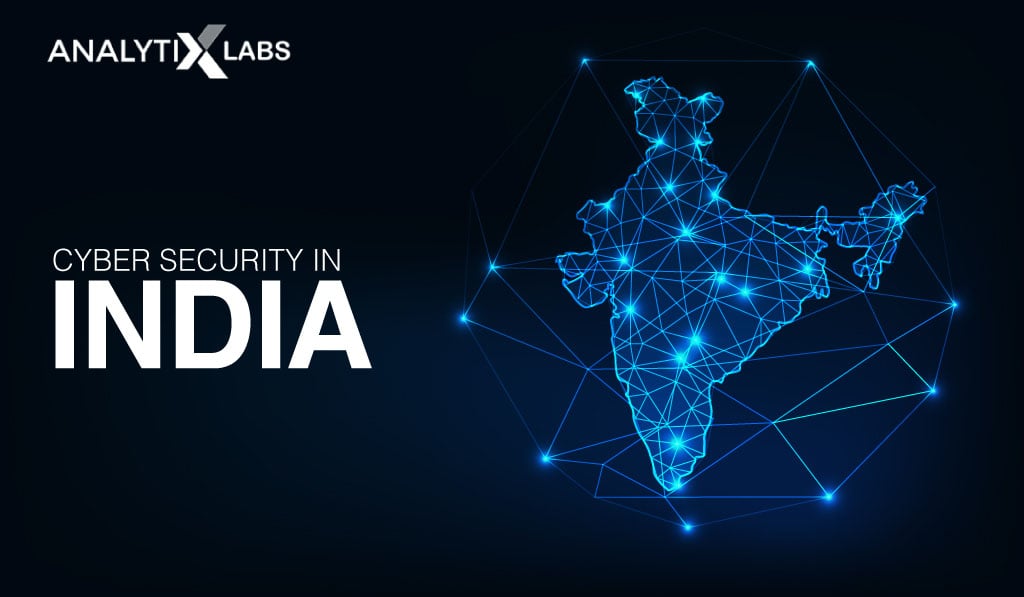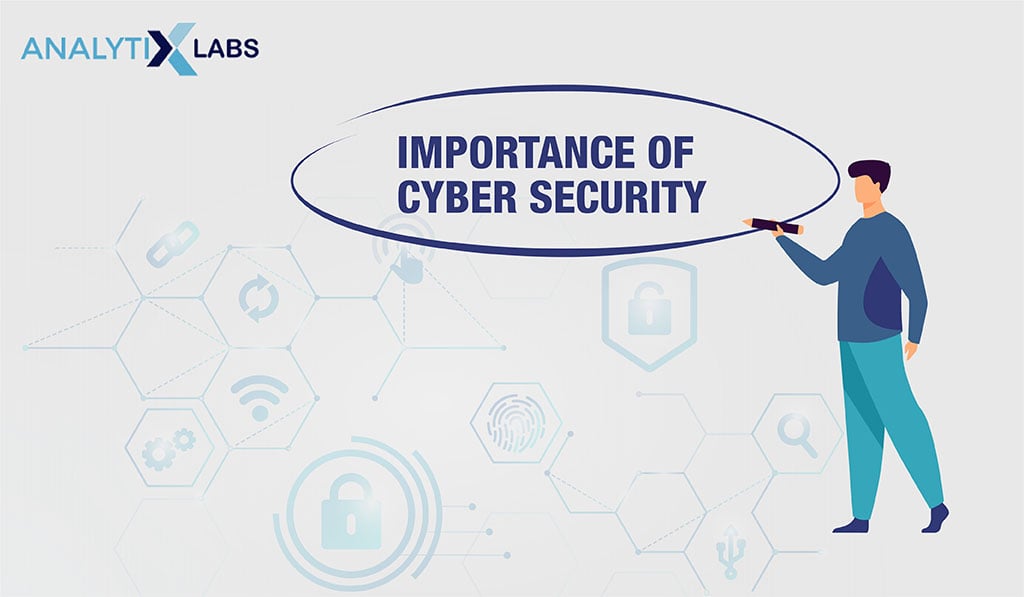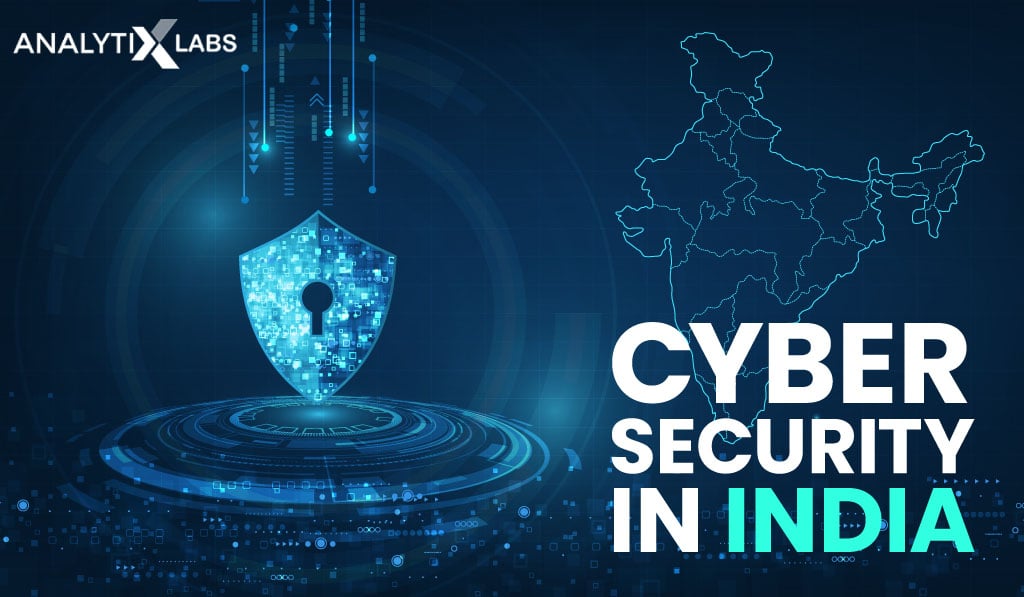In the fast-evolving technological landscape, safeguarding data is of utmost importance. Cybersecurity plays a crucial role in protecting firms from the ever-present threat of cyber-attacks, ensuring the integrity and security of sensitive information.
The cyber security market size in India is projected to reach US$13.6 Billion by 2025.
Cybersecurity is one of the fastest-growing fields globally. With the increasing reliance on technology and data today, protecting sensitive information has become more critical. As a result, there is a growing demand for skilled cybersecurity experts who can safeguard organizations from cyber threats.
As we step into 2023, the digital landscape in India demands a robust defense against cyber threats. If you have a passion for technology and problem-solving, then a career in cybersecurity in India may be the right path for you. This guide will discuss how to become a cyber security expert in India. We will also explain the cyber security career path in India and the salary of a cyber security expert in India.
What is Cyber Security?
Cybersecurity encompasses a range of measures safeguarding electronic systems from various threats, including malware and social engineering. Its importance is preventing unauthorized access, alteration, or destruction of valuable data and systems.
Cyber attacks, whether politically motivated or random acts, can lead to severe consequences, from government portals going offline to the potential loss of human lives.
Securing cyberspace requires a holistic approach, addressing external threats and internal compromises that may arise unintentionally or deliberately. It protects critical infrastructure like nuclear sites, banks, and hospitals, necessitating constant vigilance against emerging threats. Education plays a key role, with initiatives like the Government of India warning citizens about sharing sensitive information.
Cybersecurity professionals employ frequent system scans, penetration testing, antivirus software, monitoring, advanced authorization, and encryption to predict, prevent, and mitigate cyber-attacks.
Here are some important components of Cyber Security:
- Network security
- Data security
- Electronic information security
- Application security
- Cloud Security
- IoT security
- Critical Infrastructure security

Why Cyber Security is Essential in the Present Age?
In the digital age, cybersecurity is no longer a luxury but a necessity. With technology integrated into our daily lives, the vulnerability to cyber threats has surged. A single security breach can substantially affect businesses, governments, and individuals.
The evolving tactics of cybercriminals pose a challenge, intensifying the frequency and severity of attacks resulting in significant financial losses and reputational damage. Staying ahead in the ever-changing threat landscape is an ongoing struggle for organizations and individuals.
For instance, the 2017 Equifax breach resulted in the exposure of more than 145 million people’s personal data, and the 2018 Marriott breach resulted in the exposure of more than 500 million people’s personal data.
These breaches cost the organizations considerable money and damage their reputations with customers. Therefore, it highlights the need for effective cybersecurity measures to protect sensitive data and prevent such incidents.
Moreover, with the rise of technologies like artificial intelligence and the Internet of Things (IoT), the attack surface has expanded, making it easier for cybercriminals to launch advanced attacks.
Cybersecurity is a top priority for businesses, governments, and individuals alike. The rising demand for cyber security experts in the workforce reflects the growing scope for a rewarding cyber security career in India.
What Does a Cyber Security Expert Do?

A cyber expert in India is a professional who specializes in protecting computer systems and networks from attacks and breaches. The work of a cyber expert in India is to identify and prevent potential threats and respond to any incidents that may occur.
Some of the key duties and responsibilities of a cyber expert include:
- Conducting risk assessments: Analyzing risks is critical to building a cyber security career in India. A cyber expert analyzes an organization’s network, hardware, software, and data to identify potential vulnerabilities and threats.
- Implementing security measures: Based on the results of risk assessments, cyber security experts design and implement the security protocols. They must adopt different encryption methods, firewalls, and other tools to protect against attacks.
- Monitoring for suspicious activity: Cyber experts constantly monitor networks for any unusual or unauthorized activity that may indicate a threat. It includes analyzing system logs and network traffic to identify any potential attacks.
- Responding to incidents: In a cyber-attack or breach, a cyber security expert must act quickly and effectively to mitigate the damage and restore systems. This may involve isolating infected systems, implementing patches, and conducting forensic investigations.
- Providing training and education: A cyber expert in India is also responsible for educating employees on best practices for protecting sensitive data and preventing cyber attacks. It may include conducting workshops, creating security policies, and promoting awareness of potential threats.
- Keeping up with industry trends: Cyber security constantly evolves, so cyber experts must stay current on hackers’ latest technologies and techniques. It involves attending conferences, networking with other professionals, and staying informed through online resources and publications.
- Conducting audits: Regularly auditing systems and networks is essential for ensuring that security measures are up-to-date and effective. Cyber experts may perform these audits themselves or work with outside auditors to assess the organization’s level of protection.
In addition to these specific tasks, cyber security experts must possess strong analytical skills, attention to detail, and the ability to think critically and creatively. They must be able to anticipate potential threats and take proactive measures to prevent them.
In today’s digital age, where cyber attacks are becoming more frequent and sophisticated, the role of a cyber security expert is crucial in protecting personal and sensitive information. Their expertise helps organizations avoid threats and protect their data from malicious attacks.
Job Roles for a Cyber Security Expert

Cybersecurity is rapidly growing in India, with many organizations recognizing the need for skilled cybersecurity professionals to protect their digital assets. As a result, numerous job opportunities are available for those interested in pursuing a career in cyber security in India.
The prominent job roles for a cyber security expert in India are:
- Security Analyst: Security analysts assess systems and networks for vulnerabilities, identifying potential weaknesses that cybercriminals could exploit. They meticulously analyze security logs and incident reports, ensuring timely response to threats. The role involves monitoring and analyzing security systems to identify potential threats or vulnerabilities.
- Ethical Hacker/Penetration Tester: Ethical hackers, or penetration testers, simulate cyberattacks on systems to discover vulnerabilities. Their expertise assists organizations in proactively strengthening their defenses and preventing unauthorized access. These individuals use various techniques to test a system or network’s security to identify weaknesses and recommend solutions.
- Security Consultant: Cyber experts can also pursue a career in cyber security in India as security consultants. They provide valuable advice to organizations and offer guidance on developing robust security policies. Besides conducting risk assessments, they ensure compliance with industry standards and government regulations.
- Incident Responder: Respondents are on the front lines when a security breach occurs. They investigate security incidents, identifying the breach’s source, scope, and impact. They are crucial in preparing a rapid and effective response to minimize damage.
- Security Architect: Security architects design secure systems and networks in India, ensuring they are resilient against emerging threats. They develop comprehensive security plans and implement security solutions to protect sensitive data.
- Security Engineer: Security Engineers design and implement security measures to protect an organization’s systems and data. They create security systems, develop policies, and conduct vulnerability testing.
- Cryptographer: Cryptographers design and create cryptographic algorithms to secure data from unauthorized access. They also analyze existing algorithms for weaknesses and develop new solutions to protect against cyber threats.
- Forensic Analyst: Forensic analysts collect, analyze, and preserve digital evidence during a security incident. They must have a keen eye for detail and be proficient in using forensic tools to investigate cybercrime.
- Information Security Manager: Information security managers oversee the day-to-day operations of an organization’s information security program. They manage a team of cyber experts and ensure that all security measures are up to date-and functioning effectively.
- Security Consultant: Security consultants are cyber experts who provide valuable advice to organizations and offer guidance on developing robust security policies. Besides conducting risk assessments, they ensure compliance with industry standards and government regulations.
- Chief Information Security Officer (CISO): The CISO is the senior executive overseeing an organization’s information security program. They work closely with other senior leaders to develop and implement security policies and procedures.
- Cybersecurity Trainer/Instructor: Qualified and experienced cybersecurity experts also work as trainers and instructors. These individuals are responsible for developing and delivering training programs to educate employees on best practices for cyber security.
Responsibilities of a Cyber Security Expert

Cyber security experts protect computer systems, networks, and data from cyber threats like hackers, malware, and other malicious attacks. They play a critical role in the digital age by ensuring secure information being used or transmitted through technology tools.
Here are some of the key responsibilities of a cybersecurity expert:
- Risk Assessment: One of the primary responsibilities of a cyber security expert is to identify vulnerabilities in computer systems, networks, and applications. Cybersecurity experts perform routine risk assessments to identify potential threats and vulnerabilities. They evaluate the impact of various risks and conduct penetration testing to uncover potential weaknesses that cyber attackers could exploit.
- Security Implementation: Implementing robust security measures is paramount once vulnerabilities are identified. Cybersecurity experts deploy firewalls, intrusion detection systems, antivirus software, and encryption to safeguard digital assets. They must also ensure these measures are regularly updated to keep up with evolving threats.
- Security Awareness Training: Educating employees about best security practices is essential to prevent social engineering attacks. Cybersecurity experts conduct training sessions and awareness campaigns to instill a security culture within organizations.
- Incident Response: Preparing and executing incident response plans is a crucial responsibility. Cybersecurity experts must act swiftly to contain security incidents, investigate their root causes, and implement measures to prevent future breaches. It involves containing the threat and conducting forensic analysis to determine the extent of the damage
- Compliance: Cyber experts ensure organizations comply with specific data protection laws and industry regulations, such as the General Data Protection Regulation (GDPR) or the Reserve Bank of India (RBI) guidelines. They must protect customer data to avoid legal repercussions.
- Continuous Monitoring: Maintaining vigilant surveillance over networks and systems is critical to keep them safe. It involves analyzing logs and reports from various security tools and taking immediate action if potential threats are detected.
- Research and Development: Cybersecurity is a constantly evolving, and cyber experts are responsible for staying updated with the latest trends and developments. They conduct research and development to identify new threats and vulnerabilities, test emerging solutions, and develop strategies to mitigate potential risks.
- Documentation: Maintaining detailed records of security incidents, risk assessments, and security policies is crucial for future reference. Cybersecurity experts must document all their activities to help identify patterns and prevent similar incidents.
- Educating Stakeholders: An important responsibility of a cyber security expert is to educate all employees in an organization about best practices for staying safe online. It includes conducting employee training sessions, teaching individuals about phishing scams and other common threats, and promoting good cyber hygiene habits.
- Reporting: Collaborating with stakeholders such as senior management, IT teams, and other departments is essential for effective cybersecurity. Cyber experts must be able to communicate complex technical information clearly and concisely to non-technical personnel.
Career Path to Becoming a Cyber Security Expert
Cyber security has gained immense popularity in recent years, with the increasing number of cyber attacks and threats individuals and organizations face. As a result, the demand for skilled professionals looking to build a cybersecurity career in India is rising. If you are interested in pursuing a cybersecurity career in India, here is all you need to know about the cybersecurity career path in India.
Education and Courses for Becoming a Cyber Security Expert
Let’s dive into the educational prerequisites for a cybersecurity career in India. Typically, professionals in this field hold a bachelor’s degree in Computer Science, IT, or a related field. This foundational education lays the groundwork for comprehending cybersecurity complexities.
For those aiming for advanced roles and pondering how to secure a job in cybersecurity in India, pursuing a master’s degree in a relevant cyberprotection area provides advanced knowledge and access to specialized opportunities.
Education must be complemented by industry-recognized certifications, such as Certified Information Systems Security Professional (CISSP), Certified Information Systems Auditor (CISA), and Certified Information Security Manager (CISM), which validate expertise and enhance career prospects. Equally vital is practical experience gained through involvement in various industry-related cybersecurity projects.
The hands-on exposure is crucial for developing the technical skills required for a career in cyber security in India. It provides valuable insights into real-world challenges.
Many companies offer internships or entry-level positions in their cyber security departments, providing an excellent opportunity to gain practical experience. You can also participate in Capture the Flag (CTF) competitions and join online communities to improve your skills and stay updated with the latest trends and technologies in the field.
Beyond education and experience, networking plays a pivotal role. Joining professional organizations and communities connects aspiring experts with seasoned professionals. This fosters knowledge exchange, mentorship opportunities, and potential career advancements.
Projects for Becoming a Cyber Security Expert
Beyond education and certifications, if you are still figuring out how to join cyber security in India or how to get a job in cyber security in India, then you must take on projects that showcase your skills and enhance your profile.
For instance, creating a mock network or building a virtual lab allows you to apply theoretical knowledge while developing critical thinking and problem-solving abilities.
Here are some cyber security projects that can be valuable additions to your portfolio and help you understand how to become a cyber security expert in India. They will also help you stand out in a competitive job market:
-
Packet Sniffing
Packet Sniffing, also known as network traffic analysis, tracks all incoming and outgoing traffic. These are useful for comparison of real-time networks and past data for detecting abnormalities and vulnerabilities. To execute this cybersecurity project, you must be proficient in analyzing the data packets and monitoring the information contained in the packets.
-
Keylogging
A keylogger is software for tracking keystrokes made in a specific system using a keyboard device. It records user activity by monitoring previously pushed and currently used keys. This project is suitable for individuals interested in Machine Learning Cyber Security projects.
-
Text Encryption
Encryption transforms data into a hash code or cipher to thwart attackers’ unlawful access. The authorized user would have access to the content with secure keys and verification procedures. Using this project, you can break down the structure of algorithms like Caesar Cipher, Vigenere Cipher, Autokey Cipher, etc.
-
Web-Based Facial Authentication System
A Web-Based Facial Authentication System is a user authentication software. It matches 2D images with those in its database. The software works by reading the geometry of your face, such as the distance between eyes and the depth of sockets. It is commonly used in KYC processing systems or smartphones to unlock the display.
-
Image Steganography System
Steganography is the method of hiding confidential information within plain text or data. You can use image steganography as a high-level cyber security project by hiding encoded text in photos. This software allows users to use images to transmit private messages online.
Essential Skills to Learn for Cyber Security Experts
If you are interested in pursuing a career in cyber security in India, there are certain essential skills that you must possess. This section will discuss these skills and answer how to become a cyber security expert in India.
Networking and System Administration
As a cyber security expert, you should also be familiar with network architecture and design principles to identify vulnerabilities in a system. Earning certifications like CompTIA Security+ and Cisco CCNA can solidify your networking expertise. Additionally, mastering system administration is vital, involving the meticulous configuration and maintenance of computers.
Operating Systems and Virtual Machines
Cybersecurity professionals must be versatile across operating environments like Windows, Linux, and Mac OS. It includes knowledge of permissions management and securing systems against common attacks like malware and ransomware. Furthermore, proficiency in Kali Linux, a powerhouse for ethical hacking and penetration testing, is indispensable.
Network Security Control
Understanding how network components function, such as routers, firewalls, and intrusion detection systems, is critical. Leveraging firewalls to filter unauthorized traffic is paramount. Proficiency in intrusion detection systems, intrusion detection systems (IDS), virtual private networks (VPNs), and remote access further fortifies your network security acumen.
Coding
A cyber security expert must know how to code in Python, Java, C++, and JavaScript. It provides insights into potential vulnerabilities and also helps develop tools that automate the process of identifying threats. For instance, creating scripts for audits and penetration tests helps identify critical improvement areas.
Cloud Security
With the proliferation of cloud platforms like AWS and Azure, expertise in cloud security is imperative. Safeguarding data and resources in virtual environments is an emerging priority for organizations. Familiarity with platforms like AWS, Azure, and Google Cloud is necessary for cyber experts to secure data stored on the cloud and prevent unauthorized access.
Blockchain Security
As blockchain gains traction, understanding its security mechanisms is forward-thinking. Blockchain’s inherent complexity fortifies security and may extend to the Internet of Things (IoT), supply chains, identity management, and more. It is also essential to understand how smart contracts function and their implications on data privacy and security.
IoT Security
The growing number of IoT (Internet of Things) devices presents new security challenges. IoT devices are vulnerable to attacks like malware, DDoS, and data breaches. Cybersecurity experts must be familiar with securing IoT devices through techniques like encryption, authentication, and access control.
Artificial Intelligence (AI) and Machine Learning (ML)
AI and ML are revolutionizing cyber security, with AI-powered tools identifying threats much faster than traditional methods. To become a proficient cyber expert, you must know data science concepts, ML algorithms, and AI tools. Knowing how to leverage AI to mitigate threats will set you apart from other candidates.
In addition to these technical skills, soft skills are equally vital. These include:
- Analytical thinking and problem-solving abilities
- Attention to detail
- Communication and teamwork
- Adaptability and continuous learning mindset
- Ethical and professional conduct
Salary Structure of Cyber Security Experts in India
The salary of a cyber security expert in India varies significantly depending on factors like experience, industry, and the type of company. With less than three years of experience, entry-level Cybersecurity Specialists can expect annual salaries ranging from ₹5.0 Lakhs to ₹24.5 Lakhs, with an average of ₹11.9 Lakhs. Mid-level experts with 4 to 8 years of experience often command salaries between ₹8 Lakhs to ₹20 Lakhs annually. Highly experienced senior professionals with 12 or more years in the field can earn upwards of ₹20 Lakhs to ₹50 Lakhs or more.
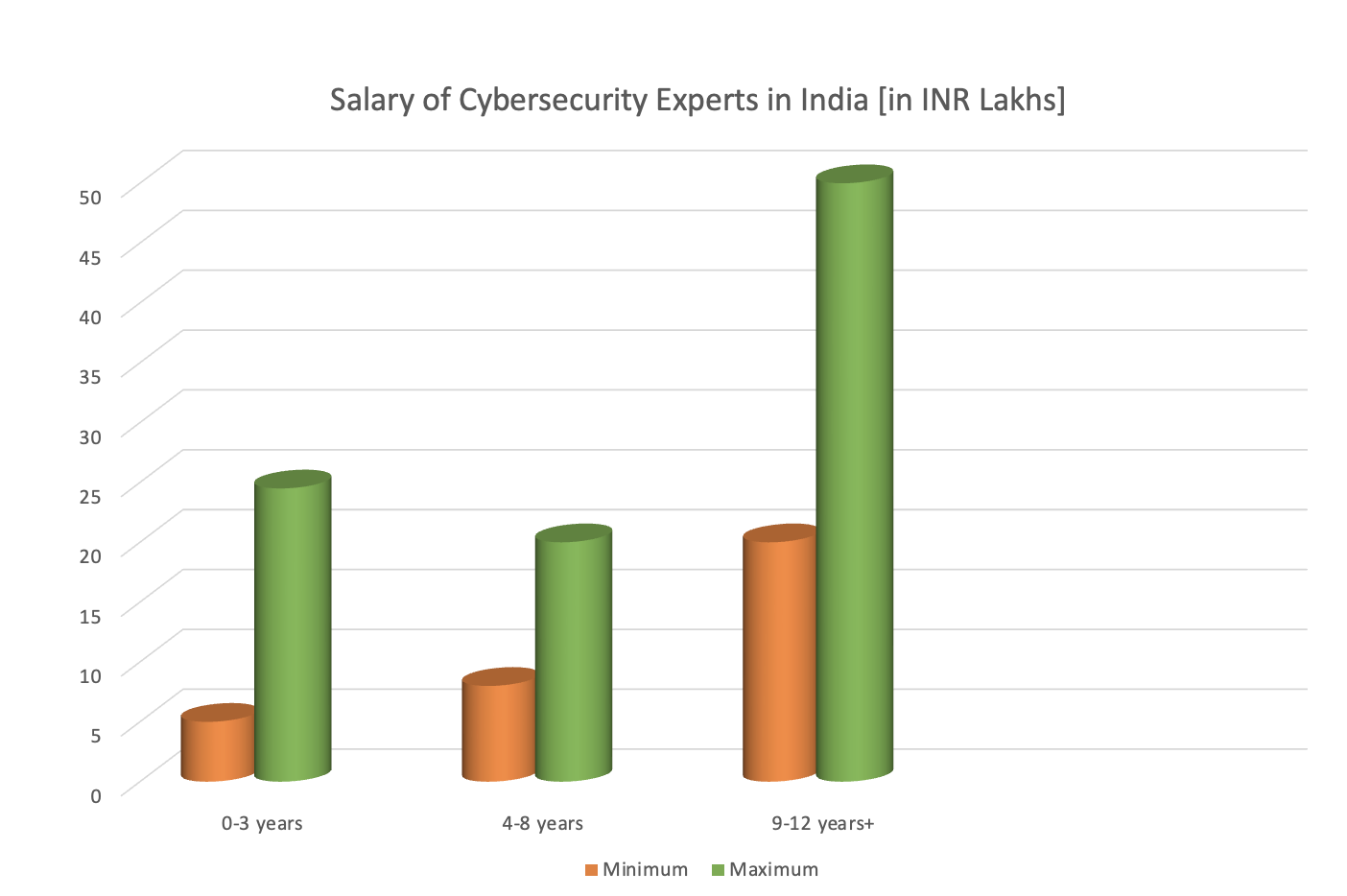
Salary disparities also exist across various industries. Sectors such as Banking and Finance and IT and Software Services tend to offer some of the highest compensation packages for Cybersecurity Specialists, often exceeding industry averages. Conversely, industries like Education and Non-profits may provide relatively lower salaries.
Furthermore, the type of company plays a pivotal role in determining compensation. India’s startups often offer competitive packages, sometimes with stock options, while established large enterprises provide stable salaries and comprehensive benefits. Multinational Corporations (MNCs) typically offer higher salaries due to their global reach and the stringent cybersecurity demands of their operations.
These salary trends reflect the growing importance of cybersecurity in India. The country has seen a significant rise in cyberattacks, with reports indicating an 18% increase in the first quarter of 2023 alone. As a result, the cybersecurity market in India is predicted to grow from USD 3.97 billion in 2023 to USD 9.21 billion by 2028, at a CAGR of 18.33%. Therefore, pursuing a cybersecurity career in India offers competitive compensation and promising growth prospects.
Challenges in Cyber Security in India
India is one of the fastest-growing economies in the world, with a rapidly developing IT industry. As more and more businesses turn to digital means for their operations, it has become imperative for them to protect themselves from cyber-attacks. It has led to a high demand for skilled professionals and much potential for a cyber security career in India.
The key challenges in Cyber Security in India are:
- Low Priority: The lack of awareness and prioritization of cyber security among businesses is also a major issue. Due to budget constraints and limited understanding of the risks involved, many companies do not invest adequately in their cyber security infrastructure, which makes them vulnerable to attacks and data breaches.
- Talent Shortage: One of the significant challenges of cyber security in India is the shortage of skilled professionals in the field of cyber security. India reports a 30% demand-supply gap in cybersecurity professionals. The skills gap is further widened by the lack of quality education and a limited number of training programs in the field.
- Rapid Pace of Technological Advancements: As new technologies are being adopted, cyber attackers are devising new ways to exploit them. It becomes a challenge for professionals to keep up with these evolving threats, leading to a constant need for upskilling and staying updated with the latest trends.
- Lack of Stakeholder Support: Coordinating with various stakeholders in cyber security is a significant challenge. Private companies, governments, law enforcement agencies, and other organizations must work together to combat cyber-attacks effectively. However, there has been a lack of collaboration and information sharing. It hampers the ability to prevent and mitigate cyber threats effectively.
- Weak Regulations: The growing number of cyber-attacks in recent years has highlighted the need for robust data privacy regulations and laws in India. While the government is taking steps towards implementing such measures, there are still challenges in enforcing them effectively.
Despite these challenges, a career in cyber security in India can be lucrative and fulfilling. With an increasing emphasis on digitalization and data protection, there is a high demand for skilled professionals in this field.
Future of a Career in Cyber Security in India
Cybersecurity is an ever-expanding career field. The demand for cybersecurity increases with the transition of the global business environment to cloud data storage and online administration. The potential risks of data being misused continue to grow with online data storage and the widely used Internet. Therefore, the requirement for a cybersecurity expert who is conversant with and skilled in the field has also been boosted.
According to NASSCOM, India’s demand for cyber security professionals is expected to reach 1 million by 2025. There is a growing need for hiring qualified individuals with experience and skills to keep up with constantly evolving technology.
The rapid growth makes India a hotspot for cyber security jobs, with various employment opportunities available across multiple industries. Intrusion Detection, Programming, Cloud security, Black-Hat thinking, Malware Analysis, and Reversing are some of the skills required to excel in the field.
FAQs
Does India have cyber security?
Yes, India does have a thriving cybersecurity industry. With the increasing digitization of businesses and personal data, cybersecurity has become more crucial than ever. As per reports, India ranked third in the list of countries most affected by cyber attacks in 2023. This highlights the growing demand for cyber professionals in the country.
Who is responsible for cyber security in India?
The Cyber Emergency Response Team (CERT) and the National Cyber Security Coordination Team (Part of the NCCC) are responsible for cyber security in India. Other than this, the defense ministry is also highly involved in national security matters.
What is the scope of cyber security in India?
The scope of cyber security in India is immense and ever-growing. With the rapid digitalization of businesses, government services, and personal data, there is a constant need for skilled cybersecurity professionals to protect against cyber threats. This has led to a rise in job opportunities and career growth prospects in cyber security.

